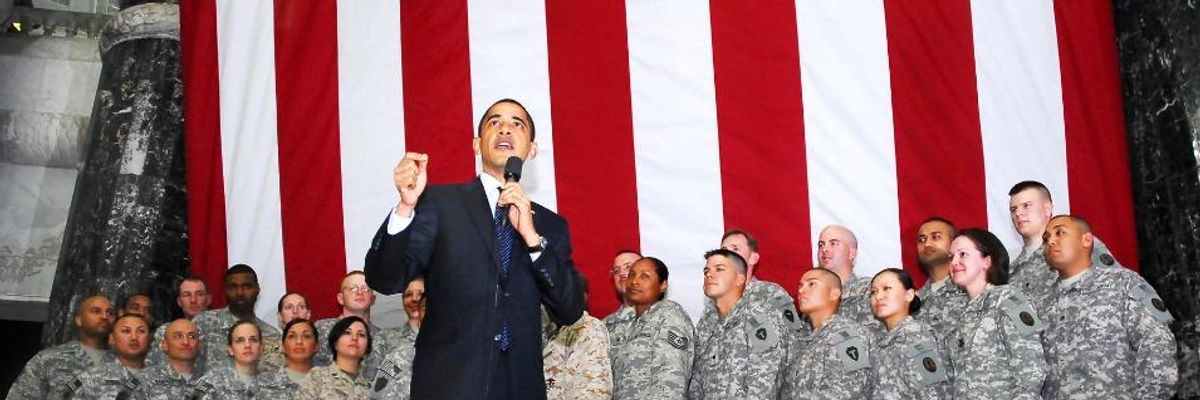Moments after Barack Obama's September 10 primetime address laying out a military plan to attack ISIS fighters in Iraq and Syria, CNN featured a debate between Republican Sen. John McCain and former White House press secretary Jay Carney. The somewhat contentious exchange went viral. "Carney, McCain Spar on CNN Over ISIS Strategy" was the headline on the NPR website. "John McCain Has a Huge Fight With Jay Carney on CNN" was how it was billed at the Huffington Post.
But to anyone who actually listened, the two did not represent especially divergent positions: Both agreed that Obama should launch military attacks, although McCain--to no one's surprise--thought they could be more aggressive.
The fact that such a narrow disagreement could be seen as a "huge fight" speaks volumes about how little debate exists in corporate media over this new phase of the "war on terror."
To gauge the range of debate over the White House airstrikes plan, FAIR surveyed some of the key discussion/debate shows during what should have been the moment of most intense consideration of military options: Right after the release of the ISIS video beheadings of two American journalists, through Obama's televised address and right up to the beginning of US airstrikes on Syria.
From September 7 through September 21, FAIR analyzed the major Sunday chat shows (NBC's Meet the Press, CBS's Face the Nation, ABC's This Week, Fox News Sunday and CNN's State of the Union), several cable news shows (the first hour of CNN's Situation Room, MSNBC's Hardball and Fox's Special Report) and the PBS NewsHour.
The study analyzed the interview and debate/discussion segments that were focused on the question of attacking Iraq and Syria. Soundbites in taped segments were not counted.
Guests were coded by partisan affiliation and relevant occupation, and whether or not they expressed a clear position on the US military strikes in Iraq, Syria or both. Sources were coded as being pro-military intervention, anti-military intervention or taking no strong position on the question.
In total, 205 sources appeared on the programs discussing military options in Syria and Iraq. Just six of these, or 3 percent, voiced opposition to US military intervention, while 125 (61 percent) spoke in favor of US war.
On the high-profile Sunday talkshows, 89 guests were invited to talk about the war. But just one, Nation editor Katrina vanden Heuvel, could be coded as an anti-war guest.
The guestlists for all the programs leaned heavily on politicians and military insiders. Current and former US government officials--politicians and White House officials--made up 37 percent of the guestlists. Current and former military officials accounted for 7 percent of sources. Journalists of various stripes--pundits, columnists and correspondents--made up 46 percent of the sources who appeared on the shows to discuss the wars.
Democrats outnumbered Republicans, 53-36, mostly due to the heavy presence of Obama administration officials advocating for White House policy.
The question of whether to launch an attack seemed almost not worth talking about. As MSNBC host Chris Matthews (9/9/14) put it, "When it comes to down to how we fight this, everybody seems to be for air attacks, airstrikes. Everybody is for drone attacks." If by "everyone," he meant the lawmakers who appear on the talkshow circuit, he was virtually correct. The most vocal critics of the Obama plan were the hawkish lawmakers who found it insufficient or strategically incoherent.
Another main point of contention was whether Congress needed to approve airstrikes on Iraq, Syria or both, or whether the executive branch could carry these out independently. This led to discussions that had the appearance of a debate, but were really just about the mechanics of warmaking.
"In the studio with me now are two members of the Senate Foreign Relations Committee who are on opposite sides of the president's request," Meet the Press host Chuck Todd explained as he introduced senators Chris Murphy (D-Conn.) and Ron Johnson (R-Wisc.) (9/21/14). But "opposite sides" referred to a vote on funding certain anti-government forces in Syria; Murphy voted no, telling Todd that while he was "broadly supportive of the president's strategy," he was not sure that "getting involved in a very complicated sectarian civil war in Syria is necessary to the overall strategy." So the debate was between two advocates for war who disagree on the type of war the United States should wage.
PBS NewsHour liberal Mark Shields (9/26/14) declared, "The absence of a debate in this country is a shame." He was referring only to Congress abdicating its responsibility to weigh in on war, but the same principle could be applied to the elite media.

